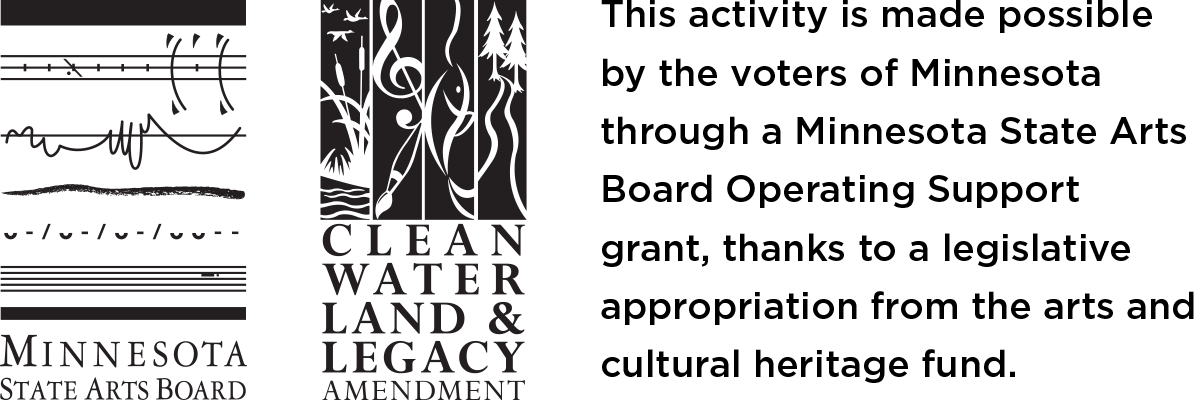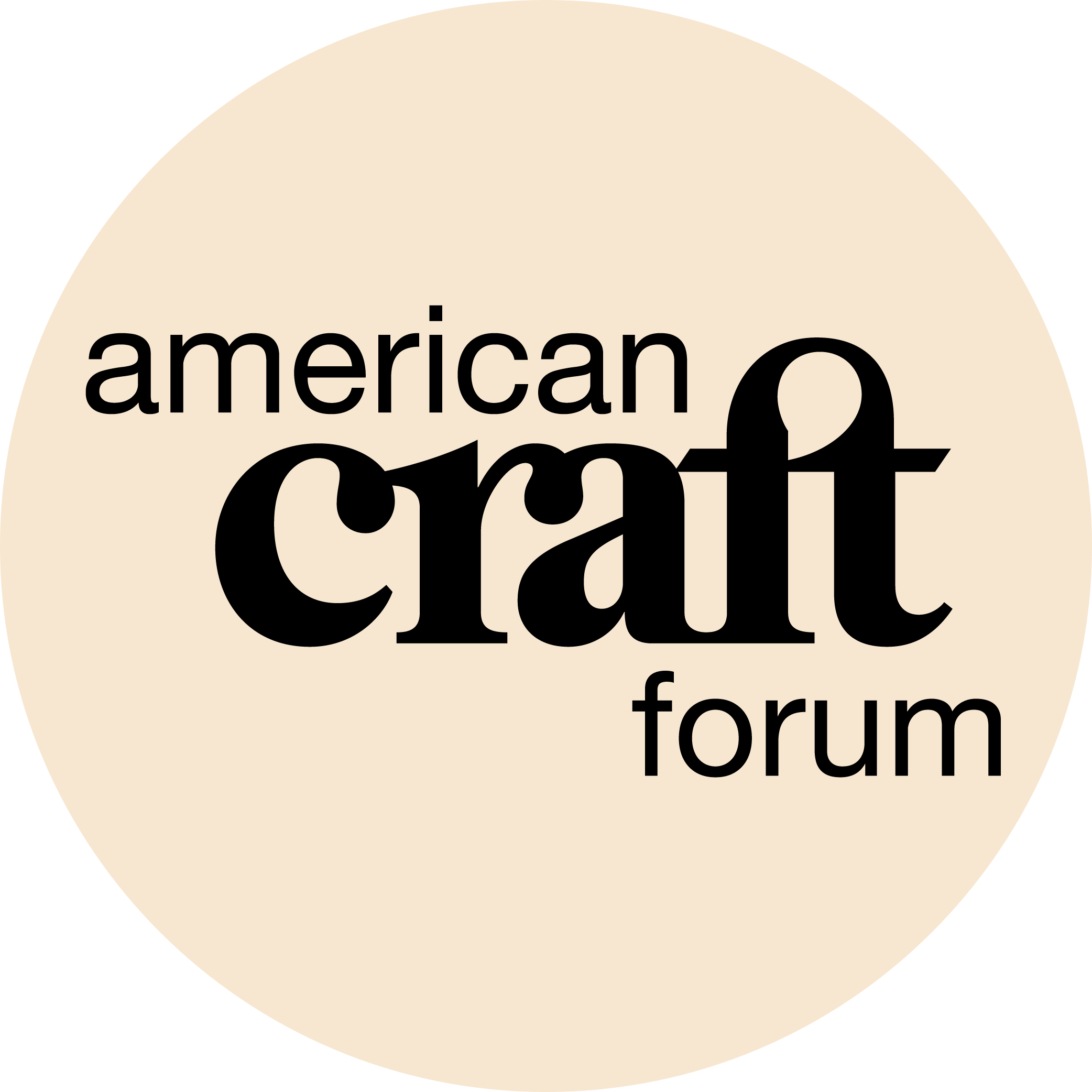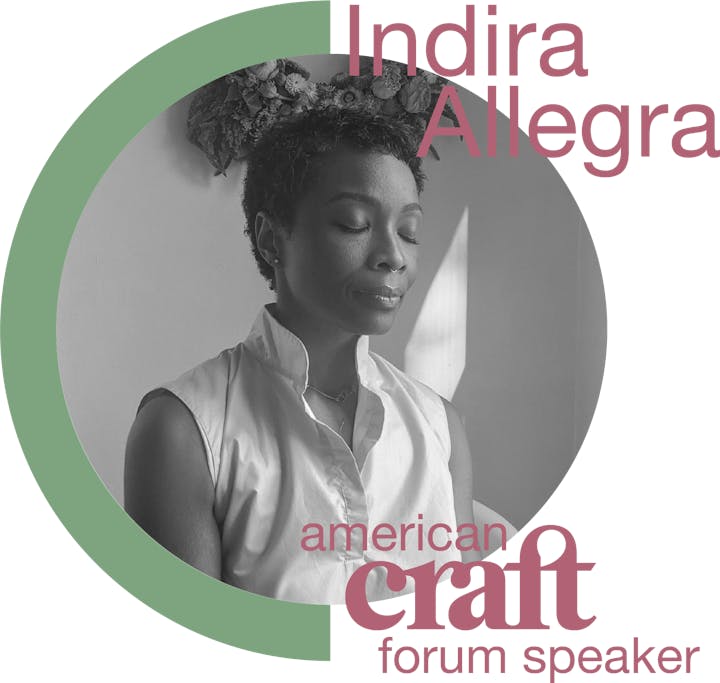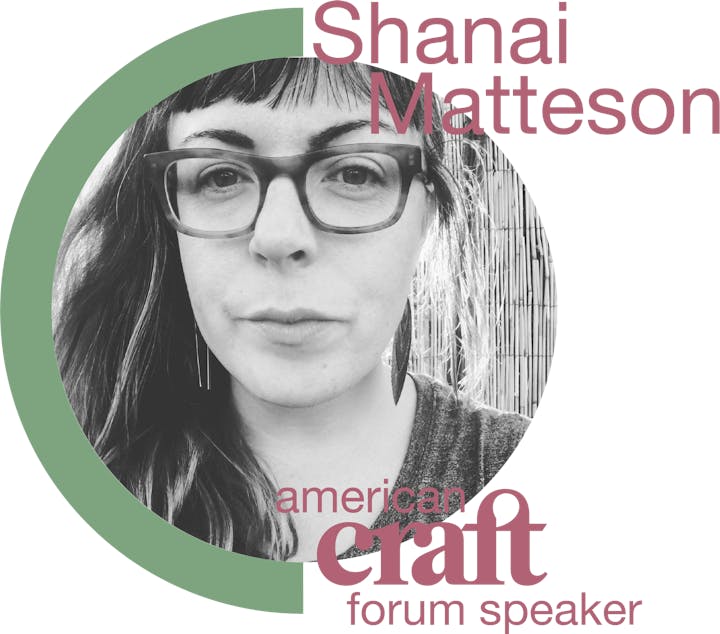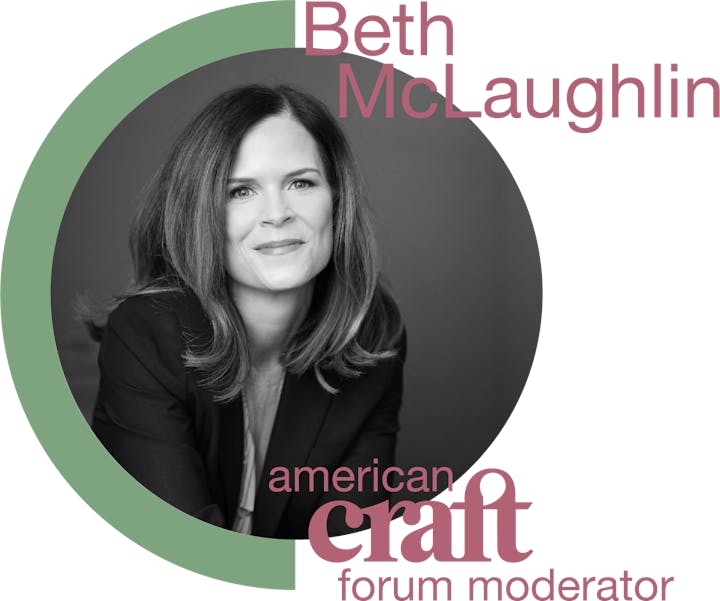Resource Guide
Resource Guide
Spring 2021 American Craft Forum: Forward Motion
We invited our Spring 2021 Forum speakers and moderator to share resources to help deepen the conversation around craft and care: books, poetry, novels, articles, and stories they're reading or writing themselves, podcasts they're listening to or contributing to, music that is moving them—anything to help inform and inspire thinking and practice around our topic.
Recommended Resources
Trust Yourself To Be Touched Playlist
The first touch we must trust is our own. This is an ambient meditation for those opening to trusting touch by their tools and materials in their studios, by their ancestors and beloveds in a future moment.
Music is very important to me as a person who is always working to think more deeply through my feeling self. I love making playlists for myself and for friends. I had asked my Instagram followers what kind of playlist they needed at this time, and themes of touch, trust, work, and intimacy kept coming up. I put this together as an offering of care.
People Fixing the World Podcast
Brilliant solutions to the world’s problems. We meet people with ideas to make the world a better place and investigate whether they work.
I grew up with a shortwave radio in my house, and BBC Radio was always of interest to me. As a weaver and poet, I am always looking for connections between things which often feel very disparate to others, and BBC Radio was a way for me as a child to make connections between my American experience and an international one. I’ve never stopped listening to the radio, and this podcast has a sweet spot in my heart, as I feel it demonstrates a deep interest in Life and the Possible. My only critique is that I would change the title to People Fixing Problems People Have Created for Themselves While the Earth Minds Its Own Business, but I understand this wouldn’t be as catchy.
Grammar of Grief Handbook
The Grammar of Grief Handbook is a living online resource I conceived for people seeking performance practices which can help them work through losses in their lives. Memorials are typically thought of as stone structures rising above eye level in a public square. The Handbook reimagines bereavement through writing, audio, or physical movement that can be created at home and come out of the body's unique relationship to grief.
COMING SOON: Unspooling die Gramgewinde: Writing with Gunta Stölzl on Grief-threads and Grief-portals
In this piece forthcoming in Textile: Journal of Cloth and Culture this summer, I consider the anatomy of the textile to contain more than warp and weft but to contain portals also—spaces between threads which are places of activity for both the maker and the viewer of the cloth. I explore these Grief-portals as die Gewindeportale where losses which the maker has experienced during the making of the cloth can be drawn through as Grief-threads or die Gramgewinde. By introducing these terms, I begin theorizing spaces between threads within the field of textiles. Adjacent to this study is an analysis of Gunta Stölzl’s work within the frame of the losses she experienced throughout her life.
JM Wong, What if care was the organizing principle of our society? (2020)
A short visionary piece asking us to consider how society would be transformed if care were the organizing principle, rather than extractive capitalism.
“What if care was the organizing principle of our society? Not profit, not white supremacist garbage masked as liberal paternalism in the form of ‘diversity’ that would hire cops of color to continue to target Black and Brown folks on the street just living their lives.”
Kenneth Bailey and Lori Lobenstine (Design Studio for Social Intervention), Social Justice in a Time of Social Distancing (2020)
A short piece that was published by the folks at DS4SI early in the pandemic. I appreciated some of the ways they spoke about shifts in social justice organizing in response to crisis, toward greater attention to collective care.
“Activating public spaces to bring people together will break our habits of isolation and individuation and help us lean into collective healing, sense-making and problem-solving. It will give us chances to see each other, to acknowledge our humanity, but also to say, 'How do we take on these arrangements?' Can we step far enough out of our individually wrapped solutions to create new, more effective, just, and collective ones?”
Winona LaDuke, To Be a Water Protector: The Rise of the Wiindigoo Slayers (2021)
A book recently published by Winona LaDuke tracing the rise of Water Protectors and the fight to stop the Line 3 oil pipeline in Northern Minnesota. Working closely with Winona and other indigenous Water Protectors and allies has had a profound impact on my own art-making and activism, as I’ve come to understand what it means to care for the lands, waters, and relationships that sustain life in the place I call home—and how those relationships are expressed and deepened through processes of creating, gift-giving and cultural storytelling.
“Since time immemorial, Indigenous Peoples have protected the earth’s precious water systems in recognition of our dependence on these living ecosystems. Water Protectors are earth warriors who put their bodies on the line in the face of powerful, violent, and destructive extractive industries supported by Wiindigoo governors. Winona LaDuke is one of those Water Protectors who has made a compelling call to all peoples to rise up and protect the water and in so doing protect life itself on this planet." ~ Pamela Palmater, Author of Warrior Life
What I want to write about now is my family (2014)
A reflection I wrote about care and arts organizing following the first Common Field convening here in Minneapolis. I was one of the hosts of this convening, a week after the birth of my daughter—and the experience had a profound impact on the ways I understood caregiving work as a way that we create and sustain communities of practice, and challenge hierarchical and extractive models of organizing.
Christina Schmid, Violence Within, Violence Without (2020)
An introduction to a series of essays by Minnesota artists whose work addresses violence—which I think of as part of our crisis of care. “The perspective I am advancing seeks to unearth those entrenched processes of ordering the social world and making (or realizing) culture that themselves are forms of violence: violence that is multiple, mundane, and perhaps all the more fundamental since it is hidden or secret violence out of which images of people are shaped, experiences of groups are coerced, and agency itself is engendered.”
Red Dirt Girls (2020)
A piece I wrote about some of the recent work I’ve been doing in Iron Range communities, for a series of essays addressing "violence within, violence without."
Learning To Sew and the Politics of Repair (2019)
A piece I wrote about the process behind some of my recent work with textiles and social practice in my home community of northern Minnesota.
Women Will Change the Range (2018)
An opinion piece I authored with my collaborator Roopali Phadke about some of the social science research we both took part in on the Iron Range, uncovering the parallel stories of extraction and care among communities here—and how these paradigms are gendered and culturally specific.
Lauren Leone, Craft in Art Therapy: Diverse Approaches to the Transformative Power Craft Materials and Methods
I’ve really been enjoying Lauren Leone’s comprehensive anthology that explores the multifaceted ways in which craft material and practice can be deployed to advance art therapy. The book touches upon the many therapeutic benefits of craft activism and other approaches that incorporate craft in self-care, and in individual, group, and community art therapy practice.
Craft Conscious Website
This resource offers abundant information for those seeking deeper knowledge and critical examination of craft objects, ideologies, and artists. The site has an abundance of rich information, including reading lists, videos, and syllabi, all centered around ten main themes: care, community, race, capitalism, gender, embodiment, tradition, nature, spiritualism, and performance.
Craft Desert Zine
I’ve been a fan of this handmade zine since the first issue. Produced by artists Adam Manley and Kerianne Quick, Craft Desert includes a variety of features that expand definitions of craft and examine the hows and whys of making by hand. While the focus is largely on work by Southwest artists, the publication does a superb job of exploring larger ideas of craft theory and making.
Making Futures 2019 Journal, People, Place, Meaning: Crafting Social Worlds and Social Making
This academic journal consists of selected papers from the 2019 Making Futures Biennial Conference, held in Plymouth, England, in September 2018. I was fortunate enough to participate in the conference and have been devouring the journal since it was released earlier this month.
Recommended by the American Craft Council
G.E. Patterson, George Floyd and Communities of Care
At East 38th Street and Chicago Avenue in Minneapolis, a self-organizing network explores what it means to construct and to maintain a space for public memory and collective action.
Cate McQuaid, Artist creates a space for healing on Zoom: ‘You’re stepping into resilience just by showing up’
Artist Chelvanaya Gabriel hosts bi-monthly Creative Resilience Dialogues, “workshops [that] focus on nonverbal expression, building community, and liberation from oppression.”
Jon Spayde, Crafting a Culture of Care
From the Spring 2021 issue of American Craft—as we rebuild our collective life, we look to what craft can teach us.
Indira Allegra, A Letter From Penelope
From the Spring 2021 issue of American Craft—through the voice of a character in Homer's Odyssey, Indira Allegra reflects on how materials can help us mourn.
Caroline Kipp, Community of Makers: Social Justice Sewing Academy
From the Spring 2021 issue of American Craft—a grassroots, volunteer-run organization, SJSA facilitates projects aimed at building community and addressing the consequences of systemic oppression.
Help Make Programs Like the American Craft Forum Possible as a Member
Joining the American Craft Council provides critical funding for a range of nonprofit programs that strengthen our community and connect people to craft, including our magazine, marketplaces, library, and more. Give your support today by joining at one of our membership levels and enjoy a subscription to American Craft and other benefits.
